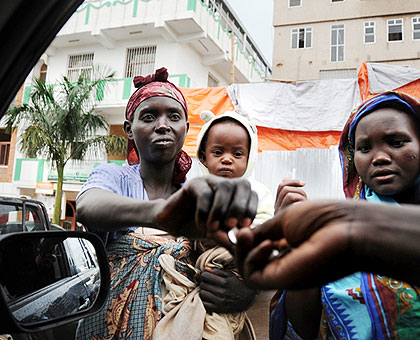Madeleine Kakuze is a single mother of two. She is not disabled, but one of his twin sons is. The two-year-old boy is an amputee, but for the mother, this disability is like the missing bread winner who should have been the children’s father—she uses him as a pitiable tool to beg.


Madeleine Kakuze is a single mother of two. She is not disabled, but one of his twin sons is. The two-year-old boy is an amputee, but for the mother, this disability is like the missing bread winner who should have been the children’s father—she uses him as a pitiable tool to beg.Every day, she brings her children to the corridor adjacent the National Institute of Statistics of Rwanda in Nyarugenge district. Here, they wait for well-wishers who can offer coins. Kakuze, 33, said they get at least Rwf1,000 daily. This puts bread on the family table as well as catering for other basic needs. Kakuze said desperation after her husband abandoned her is what pushed the family on the street. "I am not happy to be here, I wish I could have a family or start up capital so that I can try my life elsewhere and not on street,” she said. But if fresh efforts underway yield, Kakuze and her family will be out in due course. Nyarugenge district is mulling over plans to evict beggars from the streets if better projects can be advanced to cater for mainly the disabled persons.Income-generating activitiesEmmanuel Ndayisaba, the executive secretary of the National Council of People Living with Disability, said they are planning to carry out an assessment on what they think can help the beggars, especially those living with disability.Nyarugenge, the business hub of Kigali City, is where most of beggars wait for passers-by to give them a coin.Ndayisaba said they have spent a lot to help people with disabilities to leave the streets, but the remaining cases are those of people who do not want to give up begging. Officials estimate that Nyarugenge has about 95 disabled beggars.Yesterday, the district offered 150 goats in Kanyinya, Mageragere and Kigali sectors to the disabled people. "In collaboration with the National Council of People Living with Disability, we tried all our best to help them while providing them with vocational trainings like tailoring, shoe repairing but some of them resist change,” Ndayisaba said. While vending on the streets is illegal, Ndayisaba said they have an agreement with security organs that they (security personnel) should not arrest disabled vendors, a decision authorities hope will facilitate the disabled persons to earn a living.Pierre Rwaka, an MP representing people living with disability, said not all PLWDs who beg in Nyarugenge are bona fide; many of them come from neighbouring districts.The MP said they are planning a field visit to identify beggars and their origin. He says this will help them understand the beggars’ plight. The assessment awaits data on PLWDs from the last August’s census.The officials from the National Council of PLWDs argue that people should not give the disabled people coins, but instead help them change their mindset toward self-reliance.Beata Kabatesi, the in-charge of PLWDs in Nyarugenge, said the district is working with Kigali City on how to extend financial assistance to the disabled persons by grouping them in cooperatives.


